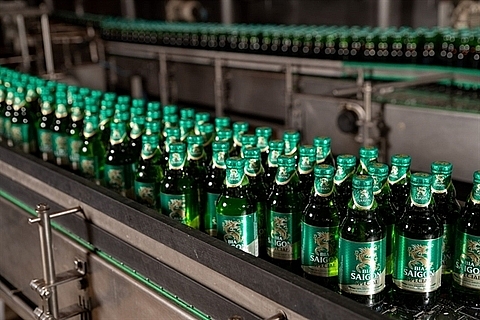Government sells stake in Vietnam's largest brewer
 |
| A beer production line of Sabeco. In the second quarter, Sabeco achieved more than VND7.1 trillion in net revenue, VND1.2 trillion in post-tax profit, both down by 21 per cent over the same period of 2019. - Photo the courtesy of Sabeco |
The value handed over to SCIC was more than VND2.3 trillion (US$99.3 million), accounting for 36 per cent of Sabeco’s charter capital, or more than 230 million shares.
Sabeco has become the first enterprise to complete such a transfer among 14 companies that must transfer State capital to SCIC before August 31 according to a prime minister decision issued in June.
Up to now, SCIC has taken over VND21.9 trillion ($945.3 million) in State capital in 1,068 enterprises.
After the transfer, SCIC will have to divest all State capital from Sabeco in accordance with the Prime Minister decision.
Speaking at the handover ceremony on Friday, Deputy Minister of Industry and Trade Cao Quoc Hung said the transfer will not interrupt production or business activities of Sabeco and will comply with the current regulations.
Meanwhile, SCIC Chairman Nguyen Duc Chi said SCIC would create the best possible conditions for Sabeco to continue to grow, bringing investment efficiency to all shareholders, including state shareholders.
Thailand’s Thai Beverage Public Co. Ltd. (ThaiBev) currently own 54 per cent of Sabeco after it purchased a majority stake worth $484 billion from the Ministry of Industry and Trade in December 2017.
After the deal, the trade ministry held nearly 36 per cent of Viet Nam’s largest local brewer by market value.
Other foreign organisations own 9.71 per cent of Sabeco, and the remaining is held by small shareholders.
In the second quarter, Sabeco achieved more than VND7.1 trillion in net revenue, VND1.2 trillion in post-tax profit, both down by 21 per cent compared to the same period last year.
In the first six months of 2020, Sabeco’s revenue and profit decreased by more than 30 per cent year-on-year, reaching more than VND12 trillion and VND1.9 trillion, respectively.
The six-month results show the company fulfilled 51 per cent of the annual revenue plan and 59 per cent of the annual profit plan.
The VBA said Decree 100, which took effect on January 1, slapped heavy sanctions on inebriated drivers, leading to plunging sales of booze.
The industry has suffered again since the beginning of 2020 as the spread of COVID-19 forces companies to announce layoffs and stores selling non-essential products are requested to close.
What the stars mean:
★ Poor ★ ★ Promising ★★★ Good ★★★★ Very good ★★★★★ Exceptional
 Tag:
Tag:
Related Contents
Latest News
More News
- Private capital funds as cornerstone of IFC plans (February 20, 2026 | 14:38)
- Priorities for building credibility and momentum within Vietnamese IFCs (February 20, 2026 | 14:29)
- How Hong Kong can bridge critical financial centre gaps (February 20, 2026 | 14:22)
- All global experiences useful for Vietnam’s international financial hub (February 20, 2026 | 14:16)
- Raised ties reaffirm strategic trust (February 20, 2026 | 14:06)
- Sustained growth can translate into income gains (February 19, 2026 | 18:55)
- The vision to maintain a stable monetary policy (February 19, 2026 | 08:50)
- Banking sector faces data governance hurdles in AI transition (February 19, 2026 | 08:00)
- AI leading to shift in banking roles (February 18, 2026 | 19:54)
- Digital banking enters season of transformation (February 16, 2026 | 09:00)






















 Mobile Version
Mobile Version